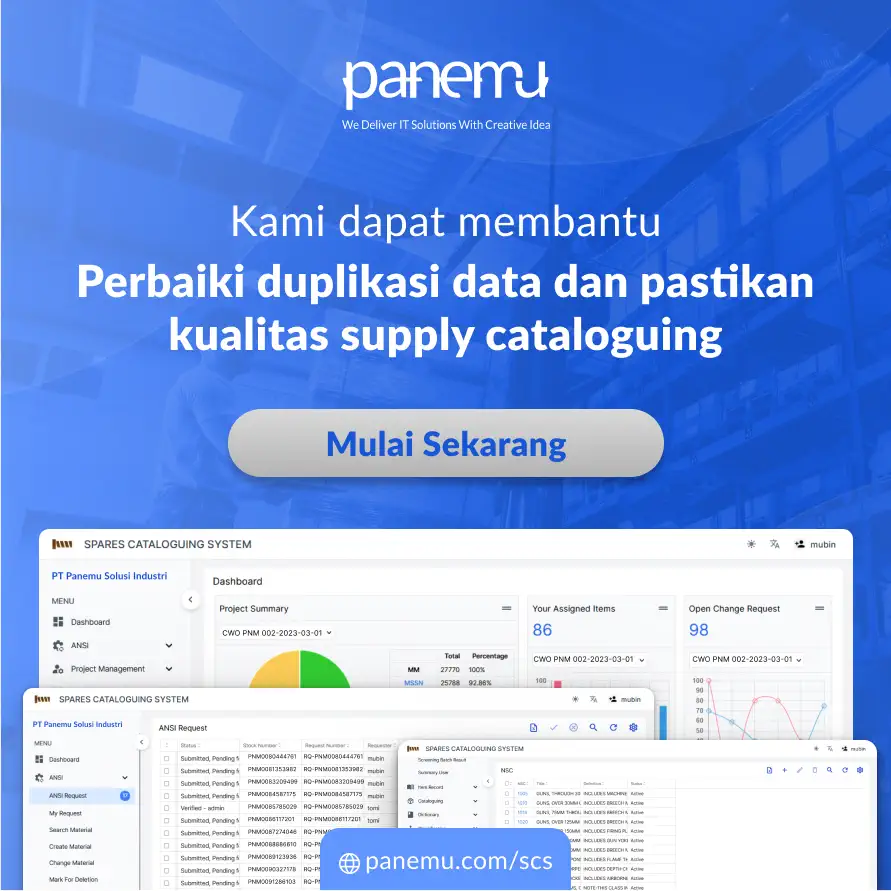In the world of industry and supply chain management, supply cataloging has a crucial role in inventory management, stock maintenance, and overall operational efficiency. Although often overlooked, establishing standards and consistency in the supply cataloging process is critical to business continuity and organizational success. This article aims to provide an in-depth and complete understanding of the importance of standards and consistency in supply cataloging.
Definition of Supply Cataloging
Supply
cataloging is the process of categorizing, grouping and documenting all
goods and materials used in the operations of a company or
organization. This includes systematic identification, description, and
numbering of items so they can be easily accessed and found. Supply
cataloging enables more efficient inventory management, accurate stock
monitoring, and faster fulfillment of customer requests.
The Importance of Standards in Supply Cataloging
a. Consistency in the Naming of Goods
The
naming of goods must be consistent and follow the standard rules that
have been set. For example, the use of uniform and unambiguous product
codes will help avoid confusion and errors in grouping goods.
b. Efficiency in Inventory Management
With
the existence of standards in supply cataloging, inventory management
will become more efficient. Proper stock identification and accurate
inventory monitoring will minimize the cost of excess or shortage of
inventory.
c. Improved Data Quality
Standards
in supply cataloging also contribute to improving data quality.
Well-structured data allows for more precise and in-depth analysis,
which in turn helps in making better decisions.
Standard Determining Factors in Supply Cataloging
a. Industry Type
Each
industry has its own uniqueness and characteristics. Therefore,
standards in supply cataloging must be adjusted to the type of industry
being managed.
b. Business Scale
The
size and scale of the business also affect the setting of standards in
supply cataloging. Large companies may require more complex and
integrated systems than small or medium businesses.
c. Regulations and Policies
The
existence of regulations and policies governing the industry or country
where the company operates must also be considered in determining
standards in supply cataloging.
Steps in Determining Supply Cataloguing Standards
a. Identification of Needs
The
first step is to identify the company's needs in the supply cataloging
process. What information needs to be documented? What is the
appropriate classification structure?
b. Consultation with Experts
Involving
experts or consultants in the development of supply cataloging
standards can provide valuable insight and ensure the standards set are
the best for the company.
c. Development and Implementation of Standards
Based
on needs and consultations, the next step is to develop supply
cataloging standards and implement them into the system used.
Consistency in Supply Cataloging
a. Consistent Application of Standards
It
is important to ensure that supply cataloging standards are applied
consistently by all sections or departments involved in this process.
b. Training and Outreach
Conducting
training and outreach to all company staff on supply cataloging
standards will help ensure the understanding and skills needed to
achieve consistency.
See more important articles:
Optimizing the Use of Supplier Code and Part Number in Supply Cataloging Tips and Tricks for Identifying and Solving Common Problems in Supply Cataloging Overcoming Challenges in Identifying and Understanding Product Specifications The Role of Supply Cataloging in Reducing Dependence on a Single Supplier
Benefits of Standards and Consistency in Supply Cataloging
a. Cost reduction
With standardized and consistent supply cataloging, companies can reduce inventory, warehousing and stock maintenance costs.
b. Better Decision Making
Standardized and consistent data enables management to make more accurate and timely decisions.
c. Operational Efficiency Improvement
Consistent
supply cataloging can improve overall operational efficiency, including
in order processing, goods delivery, and customer service.
Supply cataloging is an important process in inventory management and supply chain management. Establishing standards and consistency in these processes is vital to achieving operational efficiency and overall business success. Through identification of needs, consulting with experts, developing standards, and consistent implementation, companies can reap the enormous benefits of well-standardized supply cataloging. Thus, the company will be better prepared to face competition and challenges in the industry.
For more information about supply cataloguing service, please be easy to contact us at panemu.com/cataloguing-service


